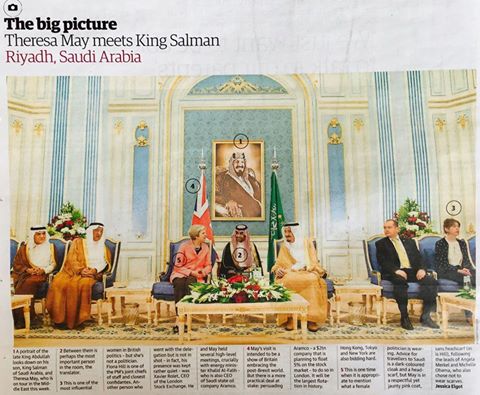On Twitter, the ITI has kindly pointed out a terminological error in last week’s Guardian. I appeared in the text of the article shown below, taken on the occasion of the UK’s not at all unelected prime minister Theresa May’s visit to those nice people in Saudi Arabia who are kind enough to buy lots of weapons off the British for use in Yemen.

The person identified as Person 2 is described as “the most important person in the room, the translator”.
I’m afraid you are wrong there, Grauniad. He may be the most important person in the room, but alas he is no translator.
The error of the Grauniad’s ways was helpfully pointed out in a letter on Tuesday by fellow linguist Jane Straker and her letter is reproduced in full below.
The big picture (5 April) was good and the numbered captions helpful. It was a boost for our profession to have the man below the late King Abdullah’s portrait described as “perhaps the most important person in the room”. However, translators are not normally people who listen and speak (sometimes simultaneously) in meetings: that is the job of interpreters. Some translators are trained to interpret, but they usually excel at writing, keyboard skills and carefully honing text. Speech is not writing; transfer of meaning between languages and cultures requires not only accuracy, speed and clarity, but impartiality. Interpreters should have no vested interest in the outcome of a meeting. It would be useful to know whether Theresa May had a British Arabic-English interpreter in her delegation.
To avoid future blunders and save interpreters from putting pen to paper – or fingers to keyboard – passing Grauniad (& other) journalists are advised to consult my handy illustrated guide to translators and interpreters.
Some linguists have remarked that the two sides of the profession should stop being so pedantic about terminology. However, I believe terminological exactitude is a crucial skill for both translators and interpreters. Give your thoughts in the comments below.